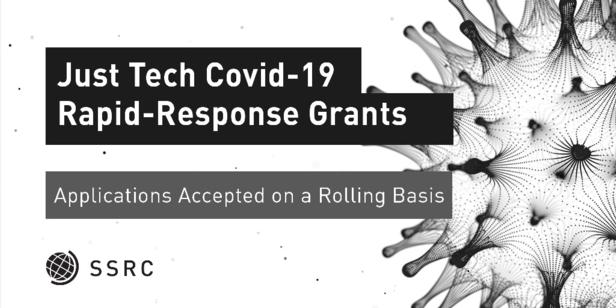The Just Tech program, the newest addition to the Media, Technology, and Politics suite of programs at the Social Science Research Council (SSRC), invites proposals from scholars in the social sciences and related fields for the Just Tech Covid-19 Rapid-Response Grants. These grants will support innovative research projects that deploy remote research methods to explore the implications of Covid-19-related public health interventions for a range of rights, liberties, and public goods. Projects illuminating the experiences of historically marginalized people are especially encouraged, as are those that can constructively inform policy responses across communities and institutions.
The Just Techprogram invites proposals for Rapid-Response Grants from researchers—based at both academic and nonacademic institutions—who hold a PhD in any social science discipline or related interdisciplinary field. The grants offer up to six months of support toward research-related expenses. These include, but are not limited to, access to datasets, archives, and relevant publications; costs related to conducting online research of various kinds; and research assistance. Applications are welcome from any country around the world. Awards will range from USD $5,000 to $10,000. Detailed eligibility requirements may be found on the FAQs page.
The full request for proposals, including a detailed list of proposal requirements and complete eligibility requirements, is available on our website. Applications will be accepted on a rolling basis, with the first period of review beginning on August 31, 2020.
For inquiries, please email just-tech@ssrc.org.
About the Program
The Just Tech program responds to a critical need in the technology ecosystem, empowering an intersectional network of scholars and practitioners to imagine and create more equitable and representative technological futures. Just Tech will foreground questions of power, justice, and public impact at a time when technological development, while not always assumed to be inherently positive, is often assumed to be an inevitable boon to society.
The program has three goals: 1) to improve our base of knowledge by creating purposive and sustainable pathways for critical research; 2) to connect and amplify scholars whose research offers necessary counters to voices and institutions that have outsized representation within the academy and the tech industry; 3) and to legitimize the work and center the needs of marginalized people, prioritizing social and political imperatives over technological ones, and challenging assumptions about how technology shapes power in society.
By creating a pipeline that fosters research and social engagement, the program will enrich public discourse, inform policy, and imagine just futures where social and public interests drive technological change, rather than the inverse.

